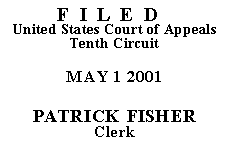

| DANNY HOWARD HANKS,
Petitioner-Appellant, |
|
| v. | |
| JAMES L. SAFFLE,
Respondent-Appellee. |
|
Danny Howard Hanks, a state prisoner appearing pro se, seeks a certificate of appealability to appeal the dismissal of his 28 U.S.C. § 2254 petition for writ of habeas corpus. We deny a certificate of appealability and dismiss the appeal.
Hanks was convicted of conspiracy to traffic a controlled dangerous substance, attempting to traffic in illegal drugs, and using a communication facility to facilitate commission of a felony. He was sentenced to two consecutive terms of fifteen years and a concurrent term of five years. On direct appeal, the Oklahoma Court of Criminal Appeals affirmed his convictions and sentences. His application for post-conviction relief in state court was denied and the Oklahoma Court of Criminal Appeals affirmed that denial.
In his habeas petition, Hanks contended he received ineffective assistance of counsel at both the trial and appellate levels by counsel failing to (1) adequately investigate and research; (2) fully advise Hanks of all consequences; (3) argue the impact of Okla. Stat. tit. 21, § 11; (4) divulge a conflict of interest; and (5) advise Hanks of the right to seek a suspended sentence. The magistrate judge recommended that the habeas petition be denied. Hanks filed objections to the magistrate's report. The district court adopted the magistrate's report and denied relief.
Under 28 U.S.C. § 2253, a certificate of appealability is required "whenever a state prisoner habeas petition relates to matters flowing from a state court detention order." Montez v. McKinna, 208 F.3d 862, 869 (10th Cir. 2000). Where, as here, the district court addressed the merits of a petitioner's claims, "the showing required to satisfy § 2253(c) is straightforward: The petitioner must demonstrate reasonable jurists would find the district court's assessment of the constitutional claims debatable or wrong." Dennis v. Poppel, 222 F.3d 1245, 1249 (10th Cir. 2000) (quoting Slack v. McDaniel, 120 S. Ct. 1595, 1604 (2000)).
Hanks contends he should be granted an evidentiary hearing to allow him to fully develop his claims of ineffective assistance of counsel and to address his allegation of a conflict of interest. We have reviewed Hanks' appellate brief and the entire record on appeal and conclude that Hanks has not demonstrated that he is entitled to a certificate of appealability.
We DENY a certificate of appealability and DISMISS the appeal for substantially the same reasons as set forth in the magistrate's report and recommendation dated October 13, 2000, and the district court's order of dismissal entered November 7, 2000.
Entered for the Court
Mary Beck Briscoe
Circuit Judge
*.This order and judgment is not binding precedent, except under the doctrines of law of the case, res judicata, and collateral estoppel. The court generally disfavors the citation of orders and judgments; nevertheless, an order and judgment may be cited under the terms and conditions of 10th Cir. R. 36.3.